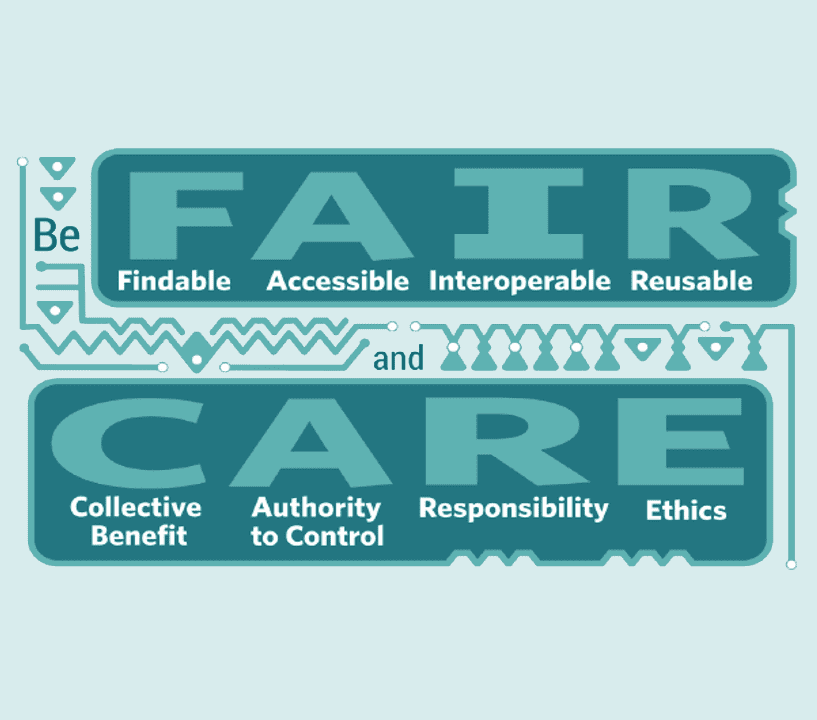CARE and FAIR principles may shape the sustainable evolution of digital cultural heritage, ensuring both ethical stewardship and lasting impact.
In the age of digital transformation, the preservation and dissemination of cultural heritage and archaeological data have become more significant than ever. The principles of FAIR (Findability, Accessibility, Interoperability, and Reuse) and CARE (Collective Benefit, Authority to Control, Responsibility, Ethics) have emerged as guiding lights in this endeavor. We delve into these principles, the challenges faced in their implementation, and the innovative solutions being developed to address these challenges.
Understanding FAIR and CARE Principles
The FAIR principles, as outlined in the article titled “Operationalizing the CARE and FAIR Principles for Indigenous data futures” by Stephanie Russo Carroll, Edit Herczog, Maui Hudson, Keith Russell, and Shelley Stall in Nature (16 April 2021), emphasize the importance of making scientific data:
- Findable: Data should be easily discoverable with a unique identifier.
- Accessible: Data should be retrievable and accessible using standardized protocols.
- Interoperable: Data should be usable with other datasets and systems.
- Reusable: Data should be well-described so that it can be replicated and reused in different studies.

The CARE principles focus on Indigenous Data Governance:
- Collective Benefit: Data activities should benefit Indigenous communities collectively.
- Authority to Control: Indigenous peoples have the right to make decisions about the collection, access, and use of their data.
- Responsibility: Those working with Indigenous data have a duty to share how it is used and to ensure its security and accuracy.
- Ethics: Data activities should align with local values and not harm the community.
Challenges and Recommendations
The article from Nature highlights several challenges in implementing the FAIR and CARE principles:
Balancing Openness with Protection: One of the primary challenges is striking a balance between making data open and accessible while protecting sensitive information, especially concerning Indigenous communities.
Diverse Stakeholder Needs: Different stakeholders, from researchers to Indigenous communities, have varied needs and expectations from the data.
Technical Limitations: There are technical challenges in ensuring data is interoperable and reusable across different platforms and systems.
Ethical Concerns: Ensuring that data activities align with local values and do not harm the community can be complex.
The article recommends a collaborative approach, involving Indigenous communities in data governance and developing tools and practices that align with both FAIR and CARE principles. It emphasizes the need for continuous dialogue, building trust, and creating frameworks that respect both scientific and Indigenous perspectives.

Codifi: Integrating FAIR/CARE in fieldwork
At Codifi, we’re working on integrating FAIR/CARE principles into all stages of fieldwork and digital recording. The new Codifi platform is designed to ensure that cultural data is collected, protected, connected, and managed in a manner that aligns with these principles.
- Collect: Codifi’s tools allow for the collection of structured data, photos, videos, audio, and geospatial data. The platform offers guidance features to ensure that cultural resources, such as Tribal Cultural Properties, are documented with care and respect. From the outset, metadata, rights management, and FAIR/CARE concepts are integrated into the workflows.
- Protect: Data security is paramount. Codifi ensures that all data is redundantly backed up in the field and is accessible only to authorized users. This includes members of a project, agency reviewers, tribal monitors, and more. The platform adheres to GDPR and other personal data protection standards.
- Connect: Data flows seamlessly to the secure Codifi Cloud, ensuring data sovereignty. Codifi guarantees that no team member can access project data, without express permission. Furthermore, the platform can be configured to deposit data into designated vaults, like a client’s AWS platform.
- Manage: Codifi’s platform facilitates the management and curation of fieldwork data. The vision is to prioritize the CARE principles for all data within Codifi and to prepare data for long-term preservation and sustainability through the FAIR principles.

A Step Forward in Collaboration
The Alexandria Archive Institute is leading a new project titled “Advancing FAIR+CARE Practices in Cultural Heritage,” funded by the Institute of Museum and Library Services’ (IMLS) National Leadership Grants for Libraries program. This 3-year project is co-directed by Sarah Whitcher Kansa (AAI/Open Context), Neha Gupta (University of British Columbia), Desireé Martinez (Cogstone Resource Management), and Chris Nicholson (Digital Antiquity / tDAR). The program aims to reconcile the apparent social and technical contradictions between the CARE and FAIR principles.
Network participants in this initiative include cultural resource management (CRM) firms, state historic preservation offices (SHPOs), Tribal historic preservation officers (THPOs), professional societies, museums, publishers, governmental agencies, libraries, and data repositories. This collaboration marks the first time representatives of diverse cultural heritage stakeholders have come together to shape data management practices and policies with FAIR/CARE at the forefront.
We look forward to engaging with the international network to inform and guide how we continue to build out the Codifi platform.
In Conclusion
The journey towards fully realizing the FAIR/CARE principles in cultural heritage and archaeology is ongoing. Tools and platforms like those developed by Codifi are stepping in the right direction. As we move forward, we invite you to engage in this conversation.
- How can we further improve the integration of FAIR/CARE principles in fieldwork?
- What are the potential challenges that we might face in the future?
- How can we ensure that the voices of Indigenous communities are at the forefront of these discussions?
About Michael Ashley
Michael Ashley is the Founder and Chief Innovation Officer for Codifi. With over 20 years of experience in program/product development, educational programming, and digital media, Michael specializes in solutions architecture, digital preservation, and paperless systems.
